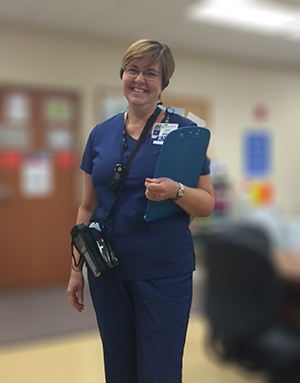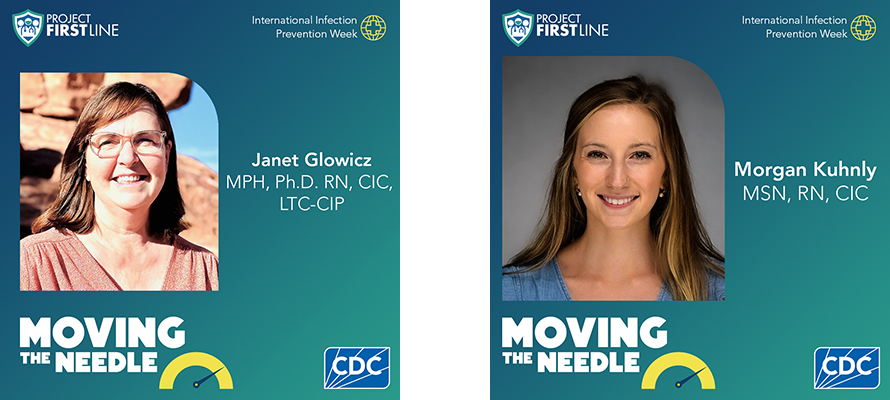
The Journey to an Infection Prevention and Control Career
In the complex world of health care, infection prevention and control (IPC) is crucial to keeping everyone safe. IPC helps protect healthcare professionals and reduces patients’ risk for healthcare-associated infections (HAIs), which they can get while or soon after receiving care. HAIs can lead to prolonged hospital stays, increased healthcare costs, and even death, but implementing effective IPC measures can significantly reduce these risks.
For many in the IPC field, the journey begins with a spark of inspiration and a deep commitment to making a difference. However, the path to becoming an IPC professional is not always straightforward.
Historically focused on acute care environments, IPC professionals now routinely work in a variety of healthcare settings, with a significant proportion influencing safe care in long-term care, nursing homes, and other settings. While many IPC professionals are nurse scientists, their experience in laboratory science and public health offer valuable contributions to the practice of IPC.
As we recognize International Infection Prevention Week, one of the themes is “Moving the Needle on the Profession’s Development.” In this new blog post, CDC’s Project Firstline dives into the experiences and insights of two dedicated healthcare professionals, whose journey in IPC is informative and inspiring. Janet Glowicz, MPH, Ph.D, RN, CIC, LTC-CIP and Morgan Kuhnly, MSN, RN, CIC, share important information on how to protect both patients and staff from infections, as well as discuss what led them to a career that they are deeply passionate about, allowing them to make a significant impact in health care.
The Spark that Ignited an IPC Journey
When asked to think about a moment that helped inspire them to become more involved in IPC, our healthcare professionals were ignited by a profound realization of their ability to significantly impact patient health. Working in the community and seeing sexually transmitted infections go unaddressed among vulnerable people first awakened Janet’s interest in public health and ultimately IPC. “The county that I lived in provided minimal public health services and I knew that people were at risk of infections but had nowhere to turn,” says Janet. That led her to eventually train in epidemiology, which made her a great fit for IPC nursing roles in hospital settings later in her career.
Morgan explained that as a nurse on both the hematology/oncology team and the high-threat infection team at Dartmouth Health, her role required paying attention to the smallest details with vulnerable patients and emerging diseases. It exposed her to populations whose outcomes were impacted by the healthcare environment and highlighted the critical importance of cleaning, disinfection, and other infection control measures in improving patient outcomes. This experience, coupled with the global COVID-19 pandemic, solidified her determination to explore every avenue to protect patients and healthcare workers alike. “There is so much we can be doing to protect everyone,” says Morgan.
The Hidden Rewards of IPC
While much of the work in healthcare IPC goes unnoticed by the public, it is integral to patient safety. For Morgan, working alongside environmental services (EVS) technicians, facility maintenance, and sterile processing technicians – roles that are often overlooked – have provided some of the most fulfilling career experiences. “There’s so much that goes on behind the scenes that’s crucial to protecting not just one patient, but the entire population that you’re serving,” says Morgan.
Janet adds, “You can make a little change and reap huge rewards. Everything is affected by infection control and there is no area within a healthcare setting that is off limits.” Being aware of the risks and taking action to prevent the spread of infections, healthcare workers can ensure faster recovery times and better overall health outcomes for their patients.
Empowering Colleagues and Building a Culture of Safety
Like any field, IPC comes with its challenges. Both Janet and Morgan explained that shortages of resources, whether supplies, financial, or staffing, can prevent the implementation of IPC measures. Through their experiences, they learned that effective IPC requires engaging healthcare workers across all levels of the organization. To help support understanding and implementation of IPC measures, CDC provides guidance and resources for facilities of all shapes and sizes.
Janet explained that by fostering a “just culture” where system-based errors are acknowledged and addressed, IPC professionals can empower colleagues to prioritize patient safety without fear of retaliation. “Creating an environment where people can talk about things that might be lapses [in IPC] that they didn’t realize were happening, without making them feel guilty.”
Morgan noted that identifying and addressing barriers to IPC, ensures the safety and well-being of all patients. She added that respecting every role equally within health care is important, particularly for staff whose work is less visible. Building this atmosphere of trust is essential to effective problem-solving and continuous improvement in patient safety.
Essential Skills for Aspiring IPC Professionals
For those considering a career in IPC, having a clinical background can be a huge asset. But certain skills, such as being detail-oriented while maintaining a big-picture perspective, are also vital.
For young healthcare workers eager to venture into IPC, the advice is clear: “Never stop learning,” Janet said. Morgan agreed, while also emphasizing, “Don’t be afraid to ask questions.” For instance, during the pandemic, some platforms offered free online education courses. Covering topics like public health and outbreak management, these courses allowed for Morgan to expand her knowledge in the area.
Teamwork and mentorships are also crucial to the world of IPC. “You cannot do this job without reaching out to others and building with each other,” Morgan continued. Local chapters of professional organizations can provide valuable opportunities for connection. Engaging and opening up a level of trust with fellow professionals and taking advantage of available resources can significantly enhance your knowledge and skills. In a world rich with information, taking initiative and being open to learning is key to success. “If we don’t have the answer, at least we have people around us who can help get us to an answer we’re close to,” says Morgan.
Reflecting on the Journey and thinking towards the Future of IPC
The future of IPC holds exciting possibilities with innovations in technology and research. (Read more about IPC research gaps.) Enhanced collaboration with technology across public health sectors can help identify potential outbreaks and optimize IPC strategies.
Janet really hopes that there can be more automated surveillance and more use of technology. Right now, IPC professionals use a great deal of time reporting infections to the national healthcare safety network. Janet says, “It’s important work, but it really means that they’re not on the patient care unit watching how work is done, gaining insight that could lead to safer practice.”
Morgan is looking forward to new opportunities that could arise when it comes to technology and even the possible incorporation of Artificial Intelligence (AI). She explained that the pandemic, despite its challenges, has highlighted the importance of teamwork and adaptability, setting the stage for continued innovation in infection control practices. By streamlining reporting processes, IPC professionals can spend more time on the front lines, observing and addressing behaviors that impact infection rates.
By sharing their journeys, Janet and Morgan offered valuable insights and inspiration for those interested in IPC as a career. By choosing this path, they are making a difference in the lives of patients and fellow healthcare workers. As healthcare continues to evolve, their commitment to IPC remains steady.
Beyond IIPW, we encourage IPC professionals to stay focused on prioritizing safety, collaboration, and innovation while embracing challenges and seizing chances for growth, as its critical to the future of health care and patient safety. For more information and to stay connected with the latest Project Firstline and CDC infection control updates, check out our website and subscribe to our distribution list.

Authors:
Dr. Janet Glowicz is a nurse epidemiologist with Project Firstline at the CDC Division of Healthcare Quality Promotion. Dr. Glowicz has practiced infection prevention in outpatient and acute care settings. At the CDC, Janet previously served as the subject matter expert for hand hygiene. Janet enjoys being onsite at healthcare facilities and interacting with frontline personnel as they implement infection control actions.
Morgan Kuhnly MSN, RN, CIC is a Nurse Infection Preventionist from New England with a Master of Science in Nursing with a specialty track of Population Health. Morgan’s expertise includes developing and implementing infection control protocols and policies, providing education, and working collaboratively with all departments and all roles to foster a culture of teamwork and safety. Morgan currently works as a Nurse Infection Preventionist contractor for the Centers for Disease Control and Prevention, and board member of APIC New England.
Mia Frederick (contractor, TANAQ) is a writer for CDC’s Project Firstline in the Division of Healthcare Quality Promotion.

